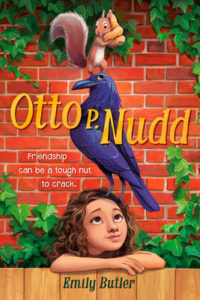 Title: Otto P. Nudd
Title: Otto P. Nudd
Author: Emily Butler
Publisher: Crown Books for Young Readers
Genre: Middle Grade Novel
Year Published: 2020
Number of Pages: 240
Binding: Hardcover
Reviewed by Karen Austin
I thought that I would read Otto P. Nudd in one afternoon, but I found that impossible.
Why?
Briefly, because the book features compelling characters addressing problems that encourage curiosity about various fields of inquiry, and this detailed story is conveyed through expertly crafted sentences.
Now to elaborate: Butler offers a tale about a Otto P. Nudd, a raven who possesses a great ability to address mechanical problems. The author situates this bird within an Ida Valley neighborhood, populated with some helpful humans, additional birds of “lesser” abilities, and one obstructionist squirrel. Keep your eyes open for the delightful monikers for the the neighborhood’s menagerie.
I learned some interesting things about mechanics, physics, and zoology. Bulter systematically explains concepts such as mechanical advantage, leverage, and opposable thumbs in a way that maintains the flow of the narrative. Details about corvids abound–many of these details are factual, some of them counterfactual. The book goads me to do additional reading on both ravens and crows.
The novel, however, is not a novelization of science textbook. The overarching conflicts are interpersonal and intrapersonal. The characters remind me of people I know and conflicts that I have experienced myself. In an effort to assist one of his favorite humans, inventor Bartleby Doyle, Otto undergoes some challenges that invite him to gain greater self-awareness and improve his interpersonal skills–with some gentle prodding by his egg-sitting wife, Lucille. It’s a little suspenseful wondering if Otto is going to accept these invitations for growth after seeing how strongly he identified with some alienating character traits displayed in the first third of the book.
As an aside to Otto’s story is Pippa’s. She’s a tween girl who helped Bartleby nurture Otto as a fledging. Now Pippa is facing challenges of her own as the ground beneath her is shifting at middle school. Even though she and her classmates are still talking about parties, doing homework together, and spending time creating games on the playground, there is a greater complexity and depth to these interactions that piques Pippa’s interest.
Yes, the science and the psychology of this novel engaged me enough to read the book with rapt attention. However, what led me to savor the book slowly was Butler’s prose style. Her sentences are elegant and lyric while also being funny and insightful. Never are her sentences heavy handed even though she clearly pays attention to her craft on the sentence level.
In this passage, Butler describes–from Pippa’s point of view–how her classmates are hesitant about playing a game based on corvid behavior: “She could feel the skepticism rolling off her classmates like waves. It was irksome, to say the least.” Her robust diction reinforced some vocabulary words for me and even had me double checking the dictionary so that I could better appreciate the nuance and complexity of words such as “prodigious” and “ludicrous.” Because the story is engaging and the tone a perfect mix of serious and playful, Otto P. Nudd is a great book for helping young readers expand their vocabularies.
But I wouldn’t cap the ideal audience at age 12. I am an empty nester, and I found the book intriguing. Now I want to find a young naturalist who would enjoy the adventure of Otto–a bird who on the surface is trying to solve a series of mechanical problems; however, he ends up with more than a mechanical advantage. He gains an improved standing with all the creatures in his neighborhood and an enriched understanding of himself.

.
Wow. I did not start this review expecting that I would want to read this book. But now I do. I totally do.